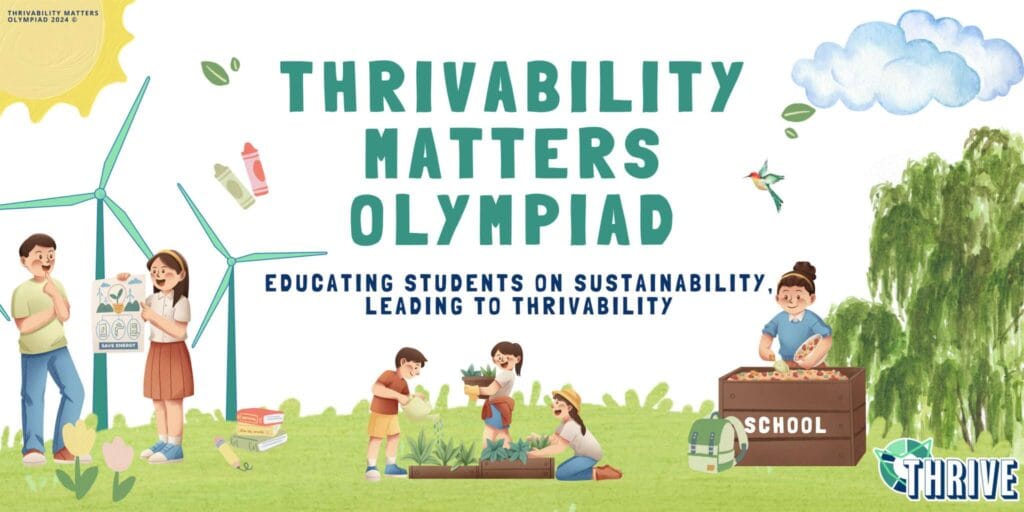Thrivability matters olympiad
THRIVE Project is hosting the Thrivability Matters Olympiad, an Olympiad program for school children to educate them on thrivability using innovative and stimulating gamification techniques.

What is this initiative?
Schools in Australia, and around the world, regularly participate in several Olympiads. These are primarily competitions among students on various subjects in science, mathematics, and art. For example, the Australian Science Olympiad (ASO) provides an opportunity for highly motivated science students to participate and enrich their skills in subjects such as physics, chemistry, environmental science, and biology.
The competitive spirit for these competitions is inspired by the Olympic Games.
The achievements of these young students in Olympiad programs are comparable to the achievements of Olympic athletes in track and field events. THRIVE Project is hosting an Olympiad program for school children to educate them on thrivability using innovative and stimulating competitions and game-based learning techniques.
Thrivability Matters Olympiad
THRIVE Project’s Thrivability Matters Olympiad is based on the ethos and ideals of the Olympic Games, in partnership with the Brisbane City Council. By initiating this youth awareness program for school students, in the years before the Brisbane Olympic Games, the ethos of the Games and awareness of our duties towards the environment can be instilled in their learning and spark inspiration.
Our planet is already stressed owing to overuse, overconsumption, and over-mining of its resources in the name of economic development. Environmental experts have warned that humans are consuming nature’s resources 1.7x faster than our planet’s biocapacity can regenerate. We are doing irreversible damage to the planet. This is not sustainable, and the next generation needs to understand the future consequences if the current rates of damage continue. They must also learn what they can do as responsible citizens to help avert these changes. The process is explained below.
The students participate in the Olympiad program, building this awareness, by developing science-based projects and various art forms related to thrivability themes, based on guidelines provided by THRIVE Project. The participating school staff educate and mentor the students on matters of thrivability, and guide them on how they can make an impact by communicating these messages of thrivability to a wider audience.
At the end of the academic year, a judging panel will select the top three projects, and the winners will be recognised at an award ceremony. The winning submissions will be displayed at a public place in Brisbane during the 2032 games for all visitors and tourists to appreciate. The names of the three students will be printed on plaques beside their contributions. Other awards include a free ticket to one of the sports competitions for the outstanding students.

A poster series has already been initiated for inclusion on THRIVE Project’s social media channels. These posters will serve as examples for schoolteachers teaching the youth about thrivability.
Pilot Project
The project will run for five years, from 2027 to 2031. All schools in Australia are eligible to register. After the pilot project is complete, the competition will likely be opened to other countries worldwide. Upon registering, the schools are provided with guidelines detailing the nature, scope, and categories of submissions that students can undertake. The recommended age is 5-17. Schools must submit their interest by completing the application form provided at the bottom of this web page. Once the form is processed by THRIVE Project, the school is registered.
A pilot project involving a small number of schools will run in 2025/2026 to test the concept before the number of participating schools is scaled up.
Conclusion
Humans are causing serious damage to the environment in the name of economic development. Olympiad competitions are frequently held in schools on subjects like science and mathematics to improve students’ comprehension of these subjects in an engaging manner. The ‘Thrivability Matters Olympiad’ program will create the same sense of competition to teach students about thrivability and inspire them to spread the message to a broader audience.
Our Olympiad competitions are designed to create awareness about the negative impacts of human development. The competitions will encourage the best ideas from students on how we can transform societal development to be thrivable. The ‘Thrivability Matters Olympiad’ will ensure the next generation is aware of the damage humans cause to the environment and how they can help avert this damage.
THRIVE Project is working with suitable industry and public sector partners to plan and execute this project to encourage youth participation in the activities leading up to the Brisbane Olympic Games in 2032. The science and art projects the students create will educate the next generation about thrivability. It will ensure they can voice their thoughts about serious environmental issues in light of the ethos of the 2032 Olympic Games.
Materials
THRIVE Project has created a range of educational materials, available to the educational institutions that register, to help guide students and teachers on thrivability. These materials are free for registered schools to download and use for educational purposes only; commercial use is not permitted.
Sample Posters


This is a sample of our growing library of educational assets. Stay tuned for information about how you and your school can register with the TM Olympiad program and gain access to our full range of materials.
Thrivability matters olympiad
Join the Thrivability Matters Olympiad and showcase your innovative solutions for a sustainable, equitable, and thriving world! Whether you’re a student, educator, or changemaker, this is your chance to collaborate, compete, and create real impact




















